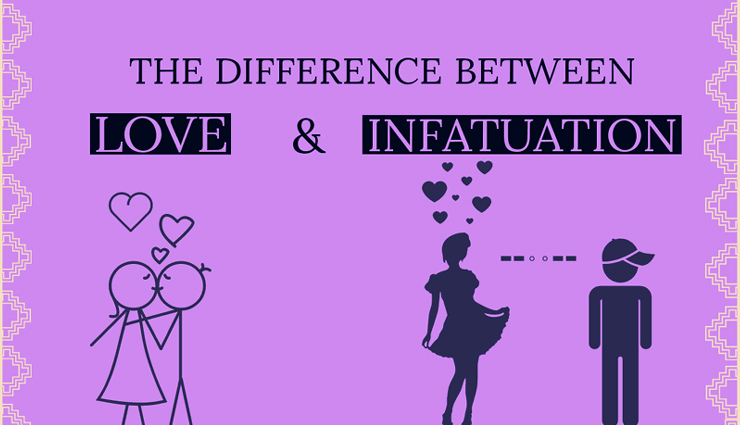- Home›
- Mates & Me›
- 12 Differences You Should Keep In Mind Between Love And Infatuation
12 Differences You Should Keep In Mind Between Love And Infatuation
By: Priyanka Maheshwari Mon, 14 Sept 2020 4:39:43

How sure are you that what you feel for your special someone right now is truly love? Is it just because you feel like the world stands still whenever s/he passes by? Or is it because you cannot get him/her out of your head?
Sometimes, what we think to be love is actually infatuation. It is too much admiration for someone that causes you poor judgments and pre-occupation. You feel so much attraction to the point that you become head over heels for that person. It is usually mistaken for love but it is actually way different.
So, how do you know if what you feel is love or infatuation? Scroll down and read these 12 differences:
Love grows; infatuation falls.
We are used to saying we fall in love. However, the real thing should be ëgrow in love. Falling is characterized by an action that is out of control and that is how infatuation happens you are suddenly spell-bound by an uncontrollable emotion.
On the other hand, true love usually has more stable foundation than emotion. It is usually founded on time spent together, friendship, respect, and trust.
Love takes time; infatuation could happen at first sight.
This is related to the first point. It is impossible to love at first sight, because you cannot know a person at first glance. What you actually feel is attraction at first sightóusually because of the personís physical appearance and too much of it is infatuation.
Yes, erotic love normally begins with attraction, but you cannot call it ìloveî until your affection has grown through deeper personal connection like friendship. It takes time to grow that kind of care for someone. We will find out why as we move along.

Love accepts; infatuation is blind.
Another clich that is not true is, ìlove is blindî. It is infatuation that is blind. When you are infatuated with a person, all you can see are his/her positive traits. No matter how much your family or friends try to tell you what they do not like about your ëloveí, you would never see their point. All you see is perfection.
When you love a person, you see his/her flaws, but you still accept the person. You do not tolerate his/her bad behaviors, but instead you try to help him/her change them for the better.
Love is unconditional; infatuation is not.
If you say you love a person, because s/he is good-looking, kind, God-fearing, or talented, then it is not love. It is only infatuation.
True love has no reasons. You love a person simply because you love him/her. Over the time of being together and going through different circumstances, you have learned to value him/her for whatever all s/he is.
Love corrects; infatuation tolerates.
When you are infatuated with a person, you try to please him/her all the time. That is why even if s/he is into something you do not agree with, you pretend to not care about it.
However, when you love a person, you care for his/her welfare more than his/her approval. If you know what s/he does can have a harmful effect on him/her, you would be willing to risk whatever relationship you have just to rebuke the person.
Love is a commitment; infatuation is an emotion.
If you think you are in love all because you feel giddy and excited whenever the person is around, then your ëloveí is too shallow. It is emotion-drivenóand that is just an infatuation.
Love is based on a decision to stay by another personís side through thick and thin, for better or worse. Even when the attraction phase is over and the dating thrill is gone, you commit yourself to be with the person.
Love inspires; infatuation distracts.
When you cannot focus on your work, because all you can do is daydream about the person; or when you skip classes just to date him/her, then it is infatuation. You have become too obsessed with the person to the extent that you cannot make proper decisions anymore.
True love inspires you to be a better person. Since it is not as emotionally-charged as infatuation, you can still think clearly to balance things.

Love sincerely cares; infatuation cares to impress.
Caring for someone and showing care for someone are two different things. If you are more concerned of him/her appreciating you than finding out how the person is REALLY doing, then it is not love. With infatuation, you show off by offering help when needed, but your main motive is actually to impressóhelp is just secondary.
On the other hand, love is after the welfare of the person. When your special someone is in need, the thought of impressing him/her would not enter your mind. Your attention is focused on doing something that can help solve whatever the problem is.
Love is selfless; infatuation is selfish.
The primary goal of infatuation is to get the attention you want from your subject of interest. Your desire is for him/her to like you back.
Love is not about you getting what you want. It is making sure the other person gets what s/he needs. An example of this is the clich that if you love a person, you would be willing to let go if that would make him/her happy.
Love forgives; infatuation forgets.
Thinking you love a person, you ignore whatever s/he does that hurts you. You become an instant martyr all because you do not want to lose the ìlove of your life. You pretend to forget what s/he has done just to keep the peace between you.
In love, you do not get blind to the bad that the other person does, but you give allowance of grace. When you get hurt by this person, you decide to forgive simply because you love him/her.
Love endures; infatuation gives up easily.
You would know how much a person loves when his/her relationship turns for the worst. If you get disappointed or hurt by the person you ëloveí and you easily turn your back on him/her, then maybe it is only infatuation. You only care for your ego.
A person who loves will work hard to keep a relationship working. No matter how hard the situation is, you will not give up that easy. You will fight for the person. You will fight for love.
Love lasts a lifetime; infatuation lasts for months.
If after three to six months of dating each other you feel like the magic is gone, then it is clear that you have not loved. You were only infatuated attract to the person.
Love lasts long because it is not based on attraction or other fleeting emotions. You will work out your commitment to stay with the person, even when s/he is not as attractive as before.





